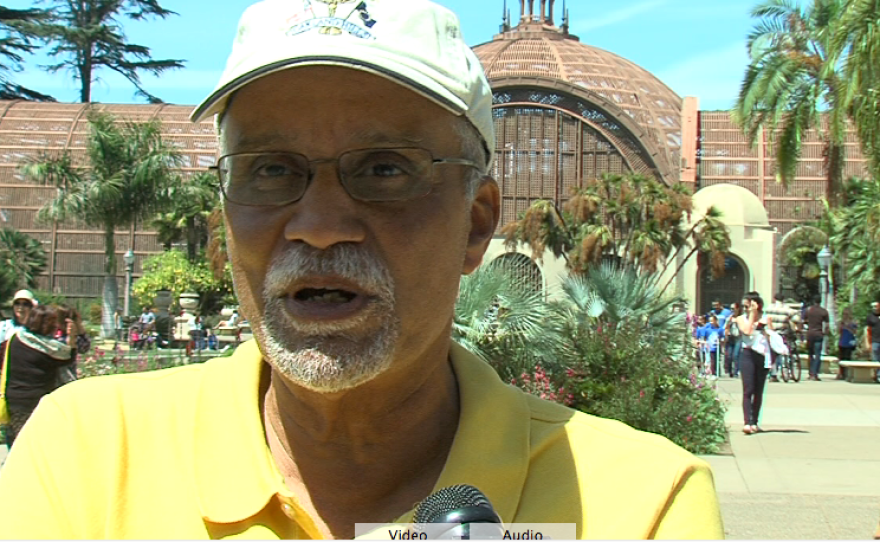San Diego City Councilman Mark Kersey recently visited a stretch of Poway Road on the border of San Diego. As the highway sign announced the beginning of the city of Poway, the road suddenly changes from one full of bumps and cracks to a road as smooth as glass.
“The mayor of Poway, Steve Vaus, is always giving me a hard time on this road and others because the city of San Diego has just not been doing a good job," Kersey said.
But the councilman said he has an answer to the dilapidated or inadequate roads, sidewalks, parks, libraries or any physical facility the city is responsible for.
“That’s really what Prop. H is all about, is addressing that issue of making sure that the next generation doesn’t have to deal with the same problem,” Kersey said.
Proposition H, also called "Rebuild San Diego", will be on the city's June 7 primary election ballot. Proponents like Kersey say it offers a solution to the multibillion dollar problem of aging or missing infrastructure in the city.
Proposition H creates no new taxes. Instead, it relies on expected future funds for infrastructure repair and construction. Over the next 25 years, it would reserve any growth in the sales tax above the rate of the Consumer Price Index and capture all cash savings from reduced payments to the city’s pension fund as the pension deficit is paid down.
Proposition H would also capture 50 percent of all growth in property tax, hotel tax and franchise fees over the next five years.
The estimated money set aside for infrastructure by Proposition H would be nearly $4 billion dollars, according to Kersey. He calls it a conservative estimate.
Rebuild San Diego qualified for the June ballot on a 7-2 vote by the San Diego City Council. The San Diego Regional Chamber of Commerce sponsored the "Yes on H" campaign, which has raised $52,000 as of this month's filing deadline.
As another exhibit in a case for action, Kersey pointed out a park in District 5, his district, that he said hasn’t been maintained since it was built by a developer decades ago. A barren-looking patch of sand is home to a handful of play structures, including a vintage steel slide and a rusting swing set.

Kersey seems committed to improving the city's infrastructure, but not everyone thinks he’s on the right track with Rebuild San Diego.
Some taxpayer advocates and city worker unions have come out against it. Some say Proposition H doesn’t raise enough money. Others argue reserving money for infrastructure will take money away from public safety. And some say there isn’t enough detail in the initiative to tell us what projects will get funded.
One of the critics is San Diego City Councilman Todd Gloria, who voted against putting Proposition H on the ballot. He said the ballot measure is little more than an extension of existing policy.
“We already take about half of our general fund revenue growth and dedicate it toward infrastructure,” Gloria said. “What I know is that 75 percent of San Diegans are unhappy with the status quo. And so what this is doing is locking in the status quo for the next 25 years. If you don’t like the roads the way they are now, you’re not going to like them after Prop. H becomes law.”

Gloria said new taxes are needed to solve the city's infrastructure problem.
“If you have a problem that’s measured $4 to $5 billion large, and you have a general fund that is $1.2 billion, it doesn’t take a math genius to figure out we need additional resources,” he said.
Balboa Park is one part of San Diego that needs better upkeep. Estimated deferred maintenance there is in the hundreds of millions of dollars.
Local Adriana Ulloa, who was visiting the park on a recent afternoon, said the city should do better.
“I think our parks, our public parks should be cared for," Ulloa said. "I think they’re very important for the community … for children and families to get together. I think we could do more and better. Lke keeping them clean would be nice.”
Ken Lamb, another San Diegan who was at the park, said crumbling infrastructure damaged his property.
“We had a flood in our complex because the storm drain system didn’t work, and we had been telling the city about it for months,” said Lamb. “Finally we had the big rain in May of 2015. The storm drain flooded and went into our garages. And yeah … we had a major mess.”
Will the ballot-box budgeting seen in Rebuild San Diego solve the problem?
Councilman Kersey said it's a big step in the right direction.

“We have never suggested that Prop. H will solve all the needs over the next 25 years. What we’re saying is we need to put the city on the right path so that we are spending money wisely and making sure that we are getting things done,” Kersey said.
The councilman adds that new revenue would be nice, but passing a tax this election year will need some luck. In November, local tax initiatives in the works seek to raise money for everything from a Chargers stadium to fire stations to mass transit. That’s not to mention a state effort to extend the Proposition 30 tax on earners over $250,000 a year.
“So you’ve got potentially five or six tax measures on the November ballot. And I think there’s a pretty good chance, if that’s the case, especially if they need a two-thirds majority, that they’re all gonna lose,” Kersey said.






